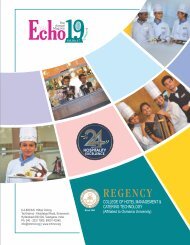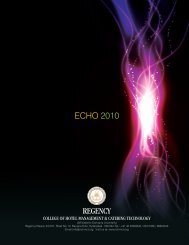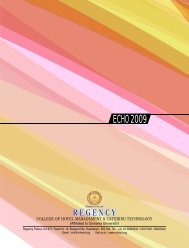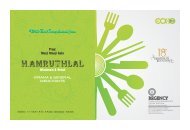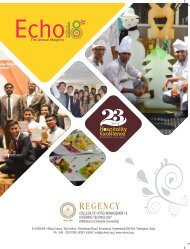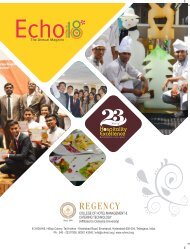ECHO 2016 COLLEGE MAGAZINE
You also want an ePaper? Increase the reach of your titles
YUMPU automatically turns print PDFs into web optimized ePapers that Google loves.
taste, people tend to associate a food’s<br />
quality level with how well it’s physical or<br />
cooked properties coincide with their<br />
preferences. Examples abound: Do you<br />
like your pizza crust crispy or soft? How<br />
sweet do you like your Qubhani? How<br />
spicy is your Biryani? Anyway, your<br />
declaration that any food is “good” is<br />
mediated by all the little nuances that<br />
are dear to your heart, and not<br />
necessarily some external, objective<br />
criteria. Another issue with evaluating<br />
food quality involves foods whose<br />
appreciation necessitates an acquired<br />
taste like the Karela Fry. There is no<br />
doubt that our palates broaden and<br />
become refined with experience and<br />
w i t h t h a t e x p e r i e n c e c o m e s a<br />
sharpening of our senses and a broader<br />
base for comparison. For example, you<br />
would be in a compromised position to<br />
judge the quality of specific Caviar based<br />
on the first time it entered your mouth. At<br />
the very least, you’d have nothing to<br />
compare it to. At the most, the “palateshock”<br />
caused by your initial exposure to<br />
the novel and strong flavor can interfere<br />
with your ability to judge it fairly.<br />
Not only does greater experience with<br />
any given food increase our capacity to<br />
evaluate it, but also experience with<br />
higher quality examples of that food. If<br />
you’ve never had a Nizami Sufiyani<br />
Biryani, you’re more likely to think the<br />
local specimen is pretty good. In fact,<br />
you may say the Local Biryani is the best<br />
one you’ve ever had. Similarly, if you’ve<br />
never or rarely been exposed to the level<br />
of Culinary Diligence Demonstrated by<br />
upper Echelon Chefs, your comparative<br />
scrutiny is restricted. Thus, having never<br />
or rarely experienced top-notch<br />
ingredients nor top-notch cooking, one’s<br />
standard for quality immediately<br />
becomes relative to their narrowed<br />
range of familiarity.<br />
Interestingly, even when exposed to the<br />
highest quality cuisine, some people<br />
r e s p o n d w i t h i n d i f f e r e n c e o r<br />
displeasure. Inevitably this disqualifying<br />
response to superior quality stems from<br />
the aforementioned lack of experience<br />
with gourmet food and professional<br />
cooking. A layman could very well dine in<br />
a top-of-the-line French restaurant and<br />
come away wondering what all the fuss<br />
is about, (and be just as satisfied with his<br />
Pulao and Chicken Curry).<br />
And then of course are the ultrasubjective<br />
factors that shape our<br />
appraisal of food quality, namely the<br />
irrational beliefs, misconceptions,<br />
phobias, and sometimes outright<br />
superstitions that a growing number of<br />
Indians harbor about food. A perfect<br />
example is “Curd and fish together<br />
causes itching” when in fact fish<br />
marinated in curd tastes heavenly.<br />
Much like beauty is in the eye of the<br />
beholder, Quality is in the tongue of the<br />
taster. Nevertheless you should pursue<br />
what you think is quality and what makes<br />
you happy and that is the Appraisal of<br />
Taste.<br />
1 2<br />
student clubs<br />
1. Gastronomy Club<br />
2. Events Club<br />
3. Greencore Club<br />
4. Hospitality Club<br />
5. Cultural Club<br />
6. Communicado Club<br />
7. Sports Club<br />
8. Disciplinary Committee<br />
3 4 5<br />
6 7 8<br />
<strong>ECHO</strong> - <strong>2016</strong> 55





